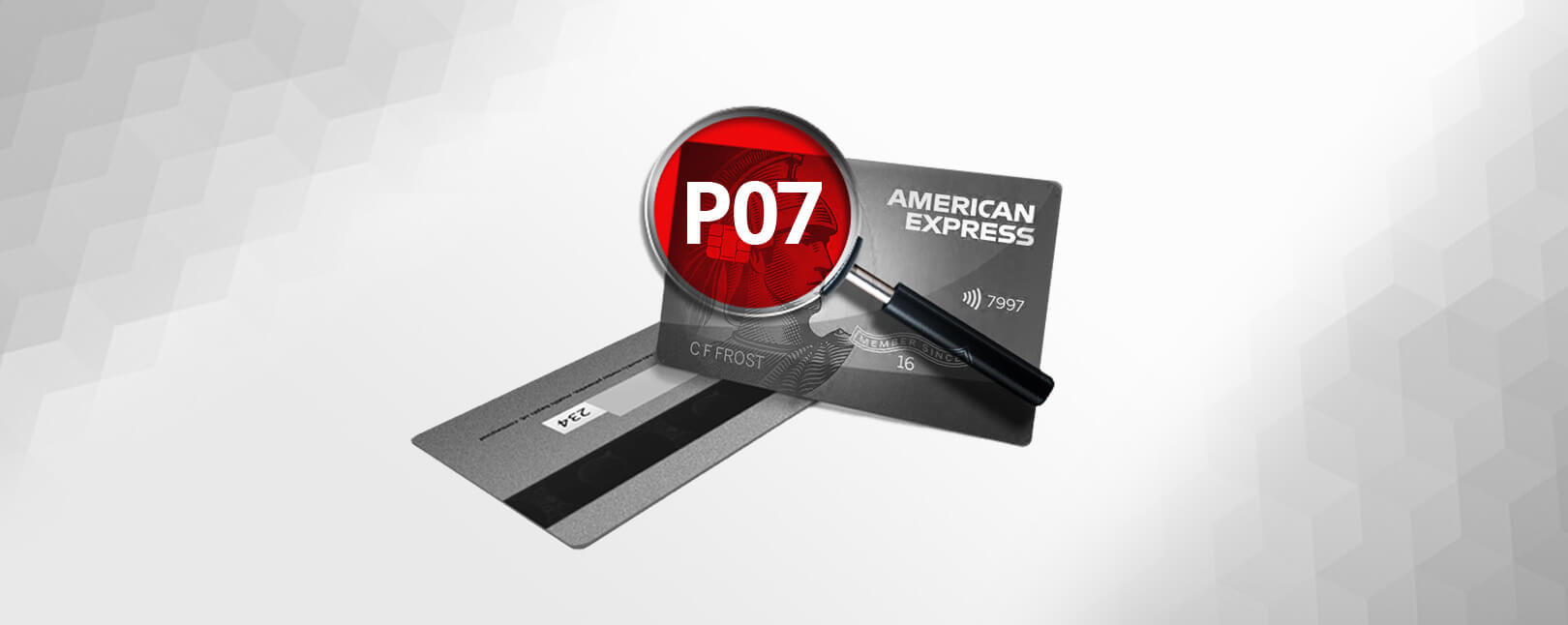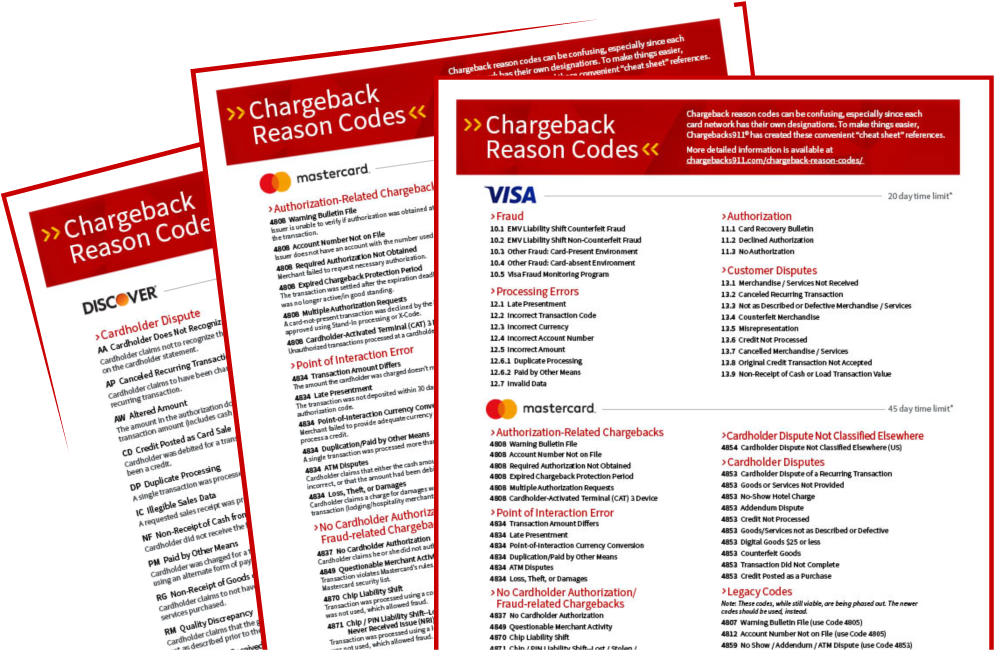
How to Handle Amex Reason Code P07 Chargebacks
American Express breaks down the acceptable causes for a customer to dispute a credit card transaction in their dispute guidelines. This is done for the sake of simplicity and standardization.
Each chargeback trigger has a designated “reason code.” Amex can then assign the appropriate code to each case to show the given reason for the chargeback.
Learn more about Amex reason codes
Today, we’re looking at one reason code in particular — P07 — and exploring the causes, timeframes, fees, and other specifics. We’ll also explore what you can do to prevent these chargebacks from happening.
Recommended reading
- Best Credit Card Processing Companies of 2025 REVEALED
- Credit Card Disputes | Step-by-Step Process Guide for 2025
- Mastercard Chargeback Time Limits: The 2025 Guide
- Chargebacks911® are Finalists for ‘Outstanding CX in Digital Sales Strategy’ for 2025!
- How to Detect Fraud: Top 20 Tips to Stop eCommerce Scams
- Verifi Order Insight: Using Data to Block Visa Disputes
What is American Express Reason Code P07?
American Express chargeback reason code P07 is “Late Submission .”
When you conduct a transaction involving a credit or debit card, that transaction needs to be submitted for processing. This is a process called “presentment,” and it’s how the money gets transferred from the customer’s account into your account.
However, banks and card networks have strict requirements for how transaction information can be submitted. You’re expected to submit every transaction in a timely manner. If you fail to do so, the authorization you received for the transaction will expire.
A reason code P07 chargeback means that the charge in question was not submitted within the time frame required by American Express.
What Caused This Dispute?
Amex Chargeback Reason Code P07 is primarily issued when the charge was not submitted in the required timeframe. To demonstrate, this scenario can arise if:

How to Respond to Amex Reason Code P07 Chargebacks
What should you do if you can prove that the presentment was completed within the required timeframe?
If you receive an American Express P07 chargeback, it's crucial to address the matter promptly. If you believe the chargeback was mistakenly issued, you should initiate a dispute response through a process called representment. This involves contesting the chargeback by presenting evidence to the card issuer, which in this case is American Express, to show that every aspect of the transaction was valid and complied with their policies.
It’s important to gather several key pieces of evidence for your case. Additionally, keep in mind that there is a strict deadline here. You have just 20 days to submit your response to American Express.
This period also includes the time taken by your acquirer to notify you of the dispute and the time spent reviewing and submitting your case. In practical situations, you may only have five days or even less to assemble and send in your response.
Acceptable Evidence for Amex Reason Code P07 Responses
You can re-represent these charges under the condition that you have compelling evidence.
For American Express reason code P07 chargebacks, you’ll need to provide proof that the charge was submitted within the required time frame. Some of the documents you can submit here include:
- Banking records, showing when the transaction was submitted
- Transaction receipts or invoices
- A copy of your terms and policies, outlining when transactions will be submitted
- Copies of any emails or phone transcripts outlining contact between you and the buyer
Alternatively, you might have already issued a credit to the buyer as a way of trying to avoid the dispute. In this case, you’ll need to offer proof that you already provided a credit to offset the amount charged.
The success of representment depends on the thoroughness and relevance of the evidence provided. Maintaining detailed records of transactions and communications with customers is vital to effectively counteract all chargebacks, including those under reason code P07.
How to Prevent Amex Reason Code P07 Chargebacks
As the old adage goes, “an ounce of prevention is worth a pound of cure.”
You may never be able to stop chargebacks entirely. But, you can limit your exposure to risk and keep your chargeback ratio in good standing by adopting a few best practices. Generally speaking, you’ll want to:
#1 | Promptly Submit Transactions For Processing
Aim to process transactions immediately, preferably on the same day that you complete the sale or provide the service. Delaying this action can lead to confusion for your customers when they eventually notice the charge on their account statement.
#2 | Submit All Required Information
Ensure that each transaction includes all essential information. This should encompass the transaction date, a straightforward description of the product or service provided, the total amount charged, and relevant customer details. Having this information readily available assists your customers in recalling and identifying their purchases with ease.
#3 | Communicate Effectively
Always engage in transparent communication with your customers, particularly when there are delays or problems during the processing phase. Providing them with updates can help avoid misunderstandings and prevent unnecessary conflicts.
#4 | Clarify Your Billing Descriptor
Ensure that your billing descriptors effectively reflect your business's name and provide a clear description of the transaction. This should include the "soft" billing descriptor that is displayed prior to the transaction being finalized. Doing so will aid customers in promptly recognizing their purchases.
#5 | Review Failed Attempts
Monitor your transaction trends for any irregularities. Identifying and resolving problems at an early stage, such as determining the cause of frequent failed presentment attempts, can help prevent chargebacks resulting from late presentment.
#6 | Review All Rule Changes Carefully
Stay updated on the most recent regulations from card networks related to presentment. Being aware of these guidelines can assist you in reducing potential disputes and enhance your ability to challenge chargebacks more successfully.
Take a Wider View
You can dispute invalid chargebacks from Amex reason code P07. However, it’s much more efficient to take a proactive stance. The same is true of the other chargeback reason codes, as well. A truly effective chargeback management strategy must encompass prevention as well as disputing cases of friendly fraud.
Chargebacks911® can help your business manage all aspects of chargeback reason codes, with proprietary technologies and experience-based expertise. Contact us today for a free ROI analysis to learn how much more you could save.
FAQs
Does Amex investigate chargebacks?
Yes. American Express investigates chargebacks by reviewing the evidence provided by both the merchant and the cardholder to determine the legitimacy of the transaction and decide on the chargeback claim. This process ensures a fair resolution based on the documentation and arguments presented by both parties.
What is the reason code for a chargeback on American Express card?
An American Express chargeback reason code is a code that identifies the specific reason a cardholder or issuing bank has disputed a transaction, guiding the merchant on the nature of the dispute and what evidence may be required to contest it. Each code corresponds to a particular issue, such as unauthorized use, processing errors, or non-receipt of goods or services. Click here to see a full list of Amex reason codes.
Do police investigate chargebacks?
Police typically do not investigate chargebacks as they are considered a dispute between the merchant and the cardholder, handled through the card issuer's internal processes. However, if fraud is suspected as the cause of a chargeback, law enforcement may be involved in investigating the fraudulent activities.
How successful are Amex disputes?
The success of an American Express dispute depends on the merchant's ability to provide compelling evidence that the transaction was valid and in accordance with Amex policies. Success rates vary widely based on the nature of the dispute and the quality of the documentation provided by the merchant.
How does American Express investigate disputes?
American Express investigates disputes by reviewing documentation and evidence provided by both the cardholder and the merchant, such as transaction receipts, proof of delivery, or communication records, to determine the validity of the chargeback claim. This process aims to ensure a fair resolution based on the facts presented by both parties.









